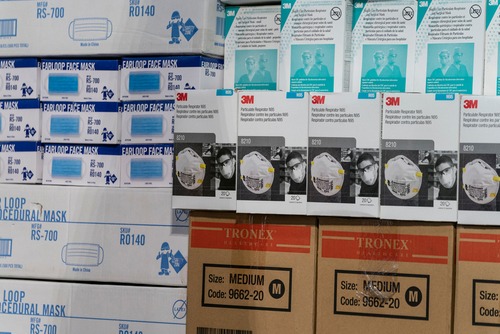
Proposed congressional legislation would overhaul the Strategic National Stockpile (SNS), expand domestic manufacturing of medical supplies and improve America’s preparedness for public health emergencies.
U.S. Sens. Bill Cassidy (R-LA) and Maggie Hassan (D-NH) on June 8 unveiled the bipartisan Strengthening America’s Strategic National Stockpile Act of 2021, S. 1974, which would amend the Public Health Service Act to improve the SNS. U.S. Rep. Elissa Slotkin (D-MI) on May 28 introduced the companion bill, H.R. 3635, in her chamber with 15 original cosponsors.
“COVID-19 showed the danger of our nation’s dependence on China and other foreign countries for life-saving supplies,” Sen. Cassidy said. “We need to strengthen the Strategic National Stockpile by producing these supplies at home which creates jobs and bolsters our independence.”
Maintained by the United States government, the SNS is the nation’s repository of antibiotics, vaccines, chemical antidotes, antitoxins, medical countermeasures, and other critical medical supplies. The role of the SNS is to supplement state and local medical supplies and equipment during public health emergencies when the immediate supply of these materials may not be available or sufficient, according to the U.S. Department of Health and Human Services (HHS).
As the coronavirus pandemic began accelerating in early 2020, the SNS was quickly pushed to its limits and “it was immediately clear that our country was unprepared to meet the magnitude of the crisis,” said Sen. Hassan.
In her home state of New Hampshire, for instance, Sen. Hassan said that medical professionals were unable to acquire the supplies that they needed to safely care for their patients, and in some cases were given defective supplies.
And when Michigan and other states called on the SNS for urgently needed masks, gloves and other protective gear, “what we got was nowhere close to what we needed,” Rep. Slotkin said, noting that the United States ended up relying on foreign countries for personal protective equipment (PPE), ventilators and other critically needed supplies.
“We can never again let our country be dependent on foreign suppliers for the equipment we need when crises like this pandemic strike,” said Slotkin.
If enacted, the measure would address the lessons of the past year by giving frontline workers the protection they need for future crises and improving maintenance and oversight of the SNS, Slotkin said.
For example, the bill would call for improved maintenance of the SNS to ensure stockpiled items are in good working order; provide more federal resources to states to expand or maintain their own strategic stockpiles of medical supplies; and bring transparency to stockpile allocations by requiring a report to Congress on all requests for stockpile supplies during the pandemic and the response to each request, according to a bill summary provided by the lawmakers.
As part of providing states with more resources, the bill would require the HHS Secretary to establish a pilot grant program for states to expand or maintain a strategic stockpile of commercially available drugs, devices, PPE, and other products that a state deems “essential in the event of a public health emergency,” according to the bill’s text.
States awarded a grant could use the funds to acquire commercially available products to include in their own strategic stockpiles; store, maintain and distribute products from their stockpiles; and conduct related planning for such activities.
Most importantly under the bill, $500 million would be authorized to be appropriated for each of the fiscal years 2022 through 2024 for medical supply chain elasticity, which would be enhanced under the bill by tasking the HHS Secretary, in consultation with the Public Health Emergency Medical Countermeasures Enterprise, with:
- Increasing or contracting emergency stock of critical medical supplies;
- Geographically diversifying domestic production of such medical supplies;
- Entering into cooperative agreements or partnerships regarding manufacturing lines, facilities and equipment to domestically produce such medical supplies; and
- Managing — either directly or through cooperative agreements with manufacturers and distributors — domestic reserves by refreshing and replenishing the stockpile of such medical supplies, according to the text of the bill.
The bill also would establish and maintain the domestic reserves of critical medical supplies, including PPE, ancillary medical supplies and other supplies required to administer drugs, vaccines and biological products, as well as diagnostic tests, according to the bill’s text.
The Senate measure has been referred to the U.S. Senate Health, Education, Labor, and Pensions Committee for consideration, while H.R. 3635 is being reviewed by the U.S. House Energy and Commerce Committee.




